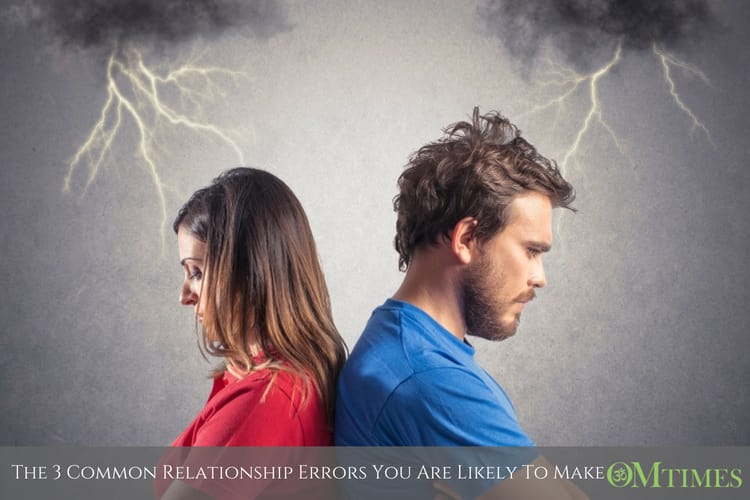The 3 Common Relationship Errors You Are Likely To Make

You may be doing everything you can to make your relationship work, but may be failing due to one of these common relationship errors.
The 3 Common Relationship Errors
There are a few basic errors we all tend to make in our relationships. These errors can cause us unnecessary unhappiness and even jeopardize the relationship we’re in. Here are a few basic relationship errors and how to avoid them:
Relationship error #1– Erroneous expectations based on things that happened to us in the past. These expectations come up because of the things we experienced at the hands of our parents or guardians or in previous relationships. If we were neglected, rejected, exploited or mistreated by our care-takers or past partners, we can begin to expect the same in our love-life today. We need to see that what happened in the past is not a predictor of what will happen today. Each situation and each relationship is different and we need to judge each person on their own merit. The way to feel less anxious about rejection, exploitation, etc. is to pay attention. When we look and listen and observe what the other person is doing, we’ll be able to tell whether or not they’re a good, loving person and right for us. When we pay attention and see a red flag, we won’t ignore it or rationalize it away, but we’ll attend to it and take care of ourselves. When we use our powers of observation and deal with the red flags as they arise, we don’t have to focus on fearful expectations based on past experiences.
Relationship error #2: Making assumptions. We can find it far too easy to assume things about the other person. We can assume that they think, feel and respond to things the same way as we do; that they want the same this as we want or that they’re going to take a certain course of action. All these assumptions have less to do with our partner and more to do with who we are. They get us into trouble and can create a lot of unhappy misunderstandings. We need to stop making assumptions and instead, always check to see what the other person thinks, wants, and intends to do. We aren’t mind readers and we can’t know the other person inside and out. We aren’t twins, either, and can’t assume that the other person is going to be like us in every way. We may have things in common, but we’re also going to have a lot of differences between us. These don’t have to be a problem if we stop making counter-productive assumptions.
Relationship error #3: Taking the other person for granted. It can be very easy, once we’re in a relationship, to think that now that we’re a couple, there’s no work involved in maintaining the relationship. That’s a dangerous mistake. People need to feel respected, cared about and understood. When we take our partner for granted, they feel none of these things. A relationship requires constant energy and effort. We have to tend to it like it’s a garden, always weeding out the negative bits, pruning back the bad choices, watering and fertilizing the love and respect between us. When we take the other person for granted, the relationship stagnates or deteriorates. When we put energy and effort into the relationship, it blossoms like a garden in the spring.
These are a few relationship pitfalls that we need to avoid if we want to have happy, healthy relationships.
You will also enjoy 6 Characteristics of an Unfaithful Person
About the Author
Marcia Sirota MD FRCP(C) is a board-certified psychiatrist, that does not ascribe to any one theoretical school. Rather, she has integrated her education and life experiences into a unique approach to the practice of psychotherapy. She considers herself a realist with a healthy measure of optimism. Sign up here for her free monthly wellness newsletter.
Dr. Marcia Sirota is a Toronto-based board certified psychiatrist specializing in the treatment of trauma and addiction, as well as founder of the Ruthless Compassion Institute, whose mandate is to promote the philosophy of Ruthless Compassion and in so doing, improve the lives of people, everywhere.






